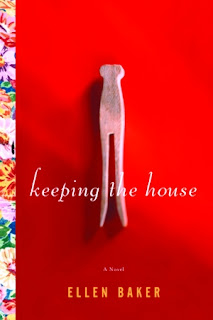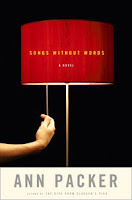
I have written a lot about Mary Doria Russell and have interviewed her a total of three times. The following interview is our very first interaction and I use the word interaction purposefully because if nothing else Mary Doria Russell is both hilarious and interactive. I will probably always remember our first interview because it was the first time that an author completely surprised me (but in a pleasant not creepy way) when she called me honey, shared her inner conversations:
"I've asked myself, "Mary, would it effing KILL you to write a novel about a middle-aged Ohio lady? Why does everything have to be so hard? Why do you always pick out something that takes years of research because you don't know jack about any of it when you start?"
All of this and she cusses! I once wrote about her: "Mary is a kind, boisterous, funny, and an honest woman who once told me that, in order to make sure she wasn't writing a 'feel-good Holocaust novel', she had quite literally flipped a coin to find out which characters would live and which would die. Mary Doria Russel likes to cuss and I like not stopping her." That introduction, we later noticed has been used by several websites when discussing the bestselling author. Mary even informed me in our last interview that my observations had been used to introduce her at the grand opening of the Granville Library.
In short, I jump at a chance to interview Mary Doria Russell. Here you can access
my second interview with Mary and my
third Mary Doria Russell interview in which she uses twice the amount of profanity as usual. There's more to it than just the brutal honesty and naughty words, Mary has also shared a great deal of her history and shared very personal childhood memories especially when discussing the character Agnes Shanklin, heroine of her latest novel
Dreamers of the Day, signs of a truly genuine nature.
Without further chatter, here is my first interview with Mary Doria Russell that has never been shared here at Loaded Questions as with all of the Blast from the Past interviews which originally appeared on another website.

 Kelly Hewitt
Kelly Hewitt: Is it true that for
A Thread of Grace you literally flipped a coin to decide if your characters would live or die?
Mary Doria Russell: Yeah, it's true. Here's the thing of it. I was writing a novel about Italy, the one nation in Nazi-occupied Europe where citizens participated in a vast conspiracy to deny the Germans what they most wanted: Jews. They were stunningly successful, despite 20 months of vicious and vindictive occupation by Italy's jilted ally. More than 85% of the Jews of Italy survived -- not only native Italian Jews but also thousands of foreign refugees.
Now the trouble with this enterprise is, whenever you write about rescuers or survivors, you invite readers to identify with them. You risk indulging fantasies like, "I would have hidden Anne Frank," or "I'd have fallen down and pretended to be dead," or "I would have emigrated at the first sign of trouble." No. You wouldn't have. The overwhelming statistical reality is, if you were Jewish, you'd have died and if you weren't, you'd either keep your mouth shut and join the party to get a job, or you'd gleefully heave a rock through somebody's shop window and take whatever you wanted. Don't kid yourself. People haven't gotten any more moral or decent or prescient in the past 60 years, I promise you.
So the problem was, How do I avoid writing a Feel-Good Holocaust Novel? Because unless you are in Darfur, right now, fighting the Janjuweed, you don't get to feel good about the Holocaust. You don't get to take vicarious credit for the balls-to-the-wall crazy-ass bravery that the Italians showed during the Nazi occupation. Only they and Paul Rusesabagina --whose resourceful courage was dramatized in Hotel Rwanda-- get to feel good about how they behaved. The rest of us should be ashamed.
I needed to do something that would make readers feel the jeopardy, the uncertainty, the complete randomness of who lived and who died. All the survivors and combat veterans I interviewed said the same thing: It was dumb luck, who lived and who died. It didn't matter if you tried to stay safe, or if you took insane chances, it was dumb luck. So my son said, "Okay, let's make a list of the characters and flip a coin. Heads they live, tails they die."
As the author, I got to decided when and how they died, but I only reversed the flip in one case, where it would have been too sentimental to accept the coin toss.
Kelly: Did the process make you nervous? Have you done this for other novels? Would you recommend it to other authors?
 Mary
Mary: No, none of the other novels seemed to call for this. I started
The Sparrow, for example, with a sole survivor, so pretty much that settled things. I loved my characters, and I delayed offing them as long as I could, but they were going down. Would I recommend it to other authors? Hell, I don't know! Unless you're writing to formula, every novel is a new puzzle. What works for one story or writer may not have anything to do with what works for another. That said, it did bring a kind of immediacy to the story. The reader was allowed to identify with a character, to buy into the decisions, and then had to "live" with the consequences.
I wanted it to be the opposite of a Star Trek novel, for example, where you know Spock and Kirk are going to live, and at the end of the story, the franchise will still be intact. That bleeds the tension out of the narrative.
I actually had one reviewer bitch that he didn't think I should have written the novel that way because it wasn't safe for him to identify with characters or fall in love with them, since they might die. Well, duh. Holocaust.
Stupid shit.
Kelly: You have been commended for the detail and intricacy of your knowledge about various military maneuvers in
A Thread of Grace which takes place in WW II Italy. Do you feel like your father's background, as a Marine Corps drill sergeant, helped to form your skills in this area?
Mary: My dad certainly helped with the weaponry. He actually knew how to field-strip an Italian sidearm, and gave me the instructions over the phone along with an estimate of how long it would take someone who was good at it vs. just learning how to do it. He was also the ideal dad for a girl. We are polar opposites politically, and have been since I was about 12, but very similar temperamentally. He instilled in me both intellectual confidence and a no-bullshit work ethic that's served me well in Academe and as a novelist. When I start something, I will hammer at it until it's done right. So he was a support both globally and with militariana. I had several others who helped with that aspect of Thread and, of course, the war itself is massively documented. I read a ton of books on the Italian campaign of 1943-45, from German, Allied, civilian
and partisan points of view.
 Kelly
Kelly:
The Sparrow and
Children of God are both highly acclaimed Science Fiction novels that also deal heavily with religion and morality. That's a lot of ground to cover but you do it with amazing ease.
Mary: Big laughs! Honey, it took me 60 drafts. What looks like "amazing ease" is the result of relentless, ruthless editing. The Sparrow was not just my first novel, it was my first attempt at creative writing of any kind, unless you count grant proposals. Remember, I'm a Ph.D. in biological anthropology. My trade was teaching gross anatomy, with a specialty in craniofacial bio mechanics. The last English course I took was during the Nixon Administration. Sonny and Cher were still married, for crissakes. I had a standard metric shit-load to learn about writing fiction, and it didn't come easily.
Kelly: A quick look at your website shows some great pictures of your pets. I've read about how important your dachshund Annie Fannie is to you. Have you ever thought about writing some children's books and using her as a character?
Mary: SHRIEKS OF LAUGHTER!!!!!!!!!! Actually, she is a character in the novel I'm writing now,which is decidedly not for children. It's called
Dreamers of the Day, and it's set against the background of the 1921 Cairo Peace Conference, when T.E. Lawrence, Winston Churchill, and Lady Gertrude Bell invented the modern Middle East.

For the past 12 years, I've asked myself, "Mary, would it effing KILL you to write a novel about a middle-aged Ohio lady? Why does everything have to be so hard? Why do you always pick out something that takes years of research because you don't know jack about any of it when you start?" This time I'm doing a first person narrative for Miss Luisa Middleton, an Ohio maiden lady on holiday in Egypt shortly after her mother dies in the Great Influenza of 1919. Luisa is traveling with her dachshund Annie (names may be changed to protect the innocent). I swear to you, the dog is an important plot device, not an annoying self-indulgence.
Admittedly, this does give an excuse to tour with my own Annie when the book comes out. She's already doing gigs with me, and I can tell you right now: she is cuter than Amy Tan's yorkies, she is better behaved than Amy Tan's yorkies, and she is way longer than Amy Tan's yorkies.
Kelly: I am one of those people who can't help but fill their shelves with books, CD, and movies. What is the one thing that loads down the shelf of Mary Doria Russell?
Mary Doria Russell: I have a nearly complete set of Dorothy Dunnett's novels. Everything I know about writing I learned from her Lymond series, mixed with what I picked up from Robert Ludlum's thrillers!


































